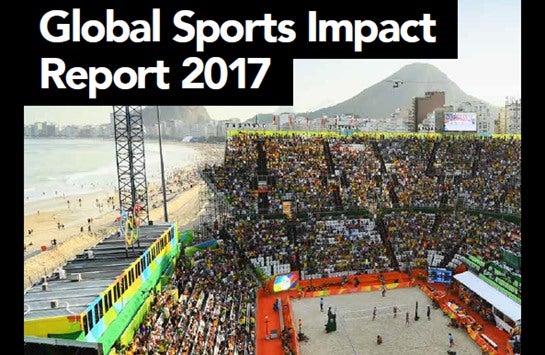
The third edition of Sportcal’s unique and groundbreaking Global Sports Impact (GSI) Report is available to order now.
Order your copy before the end of August and receive a 10% discount (25% for Sportcal subscribers) on the published price.
2016 was an Olympic year and for many sports this represents the culmination of a four-year sporting programme.
The Global Sports Impact Report 2017 provides in-depth analysis of this four-year Olympic Cycle from 2013 to 2016. Key topics such as Event Hosting and Bidding, Economic Impact, Sport Tourism, Sporting Impact and Event Analysis are featured within the report.
Governing bodies, rights holders, event organisers, government agencies, NGOs, sponsors, broadcasters and service providers will all find valuable data, analysis and insight within this 300-page report

US Tariffs are shifting - will you react or anticipate?
Don’t let policy changes catch you off guard. Stay proactive with real-time data and expert analysis.
By GlobalDataEvent Hosting and Bidding
Analysis of the 2013-2016 Olympic cycle and trends in bidding and hosting suggest that nations in Europe will continue to see their overall share of events decline when compared to nations from other continents. North America is the emerging continent and has increased its share of events throughout the Olympic period. With an Olympic Games in Los Angeles in 2028 looking near certain, in addition to an imminent Fifa World Cup bid, this trend looks set to continue.
Announced in April 2017, the Global Sports Nations and Cities Index is published in full exclusively in the report. Featuring 621 cities from 86 nations, the index analysed 705 events across 151 categories in 81 sports, including summer and winter Olympic sports and Olympic ‘recognised’ sports. USA was once again named number-one Global Sports Nation, while London, UK retained its place as number one Global Sports City.
This year’s report has also identified the top 25 most valuable events judged according to their holistic impact during the 2013-2016 cycle. The analysis has brought us closer to answering the age-old question: which major sports event produces the largest impact, after the Olympic Games and Fifa World Cup, and can therefore be considered the world’s ‘third largest sports event’?
Economic Impact
Across the 2013-2016 Olympic cycle, a staggering 54,392,673 spectators attended the 317 events analysed as part of the GSI scope of research. More than 16 million spectators attended events in 2016 alone.

A year-on-year attendance analysis of 56 of the leading annual sports properties, covering 13 sports, shows a minor decline in attendance of 0.27 per cent overall during the 2015-16/2016 season compared to the previous year. This decline comes despite event owners tweaking event formats to produce an additional 858 fixtures across the season for the analysed properties.
Sport Tourism
It is estimated that, for the 70 major events analysed in 2016, participants and media alone generated more than 1.5 million bed nights in the host cities, creating a direct economic impact of $303 million before a single ticket was sold.
Spectator-related spend for the same 70 events is estimated at $2.9 billion, generating a total direct economic impact of $3.2 billion for the host cities and nations in 2016.
Analysis of the 2013-16 Olympic cycle shows that 231,029 athletes have participated in the 303 events analysed, with a little over 91 per cent of these athletes travelling from outside the host nation in order to compete, highlighting the huge tourism benefits for cities hosting sports events from visiting athletes.
Sporting Impact
An average of 45 nations took part in the events analysed over the four-year period. By comparing the number of competing nations to governing bodies membership, the research shows that there are many nations that don’t send athletes to compete at the major world championships. These emerging countries clearly need more development support to compete at the global level.

Of the 231,029 athletes total, 41.3 per cent were women, signifying that there is still work to be done to ensure gender parity within sport. The IOC is, however, making progress, as the number of female athletes competing at the Olympic Games continued to rise at Rio 2016, with female athletes comprising 45 per cent of all participants at the games, a 0.8-per-cent improvement on London 2012.
Event Analysis
All 70 multisport games, world and continental championships analysed in 2016 feature in a standardised format within the Event Analysis chapter.
Each event analysis contains up to 40 data indicators covering the Economic, Sporting, Media and Social impact pillars, as well as key event details and hosting patterns.
These pages allow a like-for-like comparison between events, and between multiple editions of the same event. This information is invaluable to potential host cities and nations looking to attract major sporting events. It also helps event owners and organisers understand more about the holistic impact of their events and compare how their events are performing against others, and how they might improve their performance in the future.
About the Global Sports Impact (GSI) Report
The Global Sports Impact (GSI) Report is a product of the GSI Project and is published annually. The report aims to analyse and benchmark major events and their impacts using the GSI Methodology.
The GSI Report was first produced in 2015, bringing together data and narrative from major sporting events from the previous year, covering economic, media, sporting and social impact pillars.






